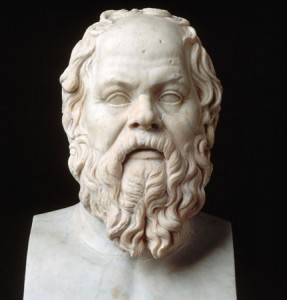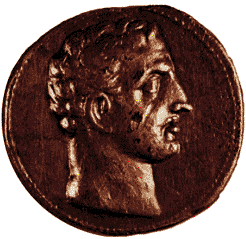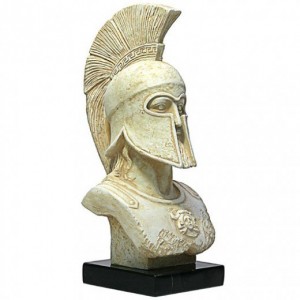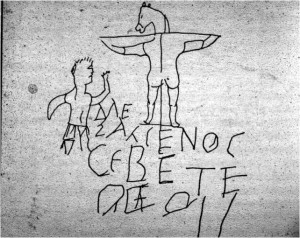If we needed proof that New Atheism has become a viscerally anti-intellectual movement, we need do little more than consider Jerry Coyne’s recent foray into ancient history. Although he is agnostic about the existence of Jesus, in two recent posts he is comes down on the “mythicist” side of the debate. Any informed reader not familiar with the strange new world of the New Atheists might wonder which mainstream scholars are debating Jesus’ existence. But Coyne is a scientist, and sees more clearly than other scholars. So he sets out his case against reason and evidence:
 Is there anyone in history with so little contemporaneous attestation who is nevertheless seen by millions as having really existed? There is of course Socrates, but of course we have a historical figure, Plato, who attests to his existence. Yet even that is overlain with a patina of mythicism, and I don’t think most scholars would say that Socrates existed with the certainty that Christians (or even atheists like Bart Ehrman) would say that Jesus existed. And there’s no religion based on the historical existence of Socrates. As for Shakespeare, well, we have his signature and a fair amount of contemporaneous evidence that he really did exist; we just don’t know for sure that he wrote those plays (absence of evidence).
Is there anyone in history with so little contemporaneous attestation who is nevertheless seen by millions as having really existed? There is of course Socrates, but of course we have a historical figure, Plato, who attests to his existence. Yet even that is overlain with a patina of mythicism, and I don’t think most scholars would say that Socrates existed with the certainty that Christians (or even atheists like Bart Ehrman) would say that Jesus existed. And there’s no religion based on the historical existence of Socrates. As for Shakespeare, well, we have his signature and a fair amount of contemporaneous evidence that he really did exist; we just don’t know for sure that he wrote those plays (absence of evidence).
 Let’s break that astonishing blast of ignorance down into its constituent parts. First of all, we need to rescue poor Socrates from the realm of non-existent things. Plato was not the only ancient author who attested to his existence; the dramatist Aristophanes and the historian Xenophon both wrote about Socrates and both knew him personally. Xenophon’s Hellenica, his account of the final years of the Peloponnesian War, notes in an aside that Socrates was the sole voice of dissent at a show trial:
Let’s break that astonishing blast of ignorance down into its constituent parts. First of all, we need to rescue poor Socrates from the realm of non-existent things. Plato was not the only ancient author who attested to his existence; the dramatist Aristophanes and the historian Xenophon both wrote about Socrates and both knew him personally. Xenophon’s Hellenica, his account of the final years of the Peloponnesian War, notes in an aside that Socrates was the sole voice of dissent at a show trial:
…all agreed with one exception to permit the voting. This obstinate dissident was Socrates, the son of Sophroniscus, who insisted that he would do nothing except in accordance with the law. (I.7.15)
Xenophon also provides us with an Apology, his account of Socrate’s trial and execution. Although Xenophon was absent from Athens, having embarked on a foolish military adventure in Persia, he relied on the eyewitness testimony of the philosopher Hermogenes (both Plato and Xenophon agree that Hermogenes was present at the trial). When we add the testimony of Plato, Xenophon and Aristophanes to the numerous Dialogues which treated Socrates as an historical figure, we can safely say that Socrates existed.
 Xenophon and Plato actually knew Socrates; but is there anyone in history with no contemporaneous existence who is seen by millions – and by trained historians – as having really existed? Fifteen minutes in a University library would have answered that question for Professor Coyne. Hannibal Barca, one of the greatest generals of history, is a fine example. He lived from 247 to around 182 and was the scourge of Rome during the Second Punic War. Our information about Hannibal comes from later historians, such as Appian, Livy and Polybius. Does that cast doubt on Hannibal’s military success or very existence? Hardly.
Xenophon and Plato actually knew Socrates; but is there anyone in history with no contemporaneous existence who is seen by millions – and by trained historians – as having really existed? Fifteen minutes in a University library would have answered that question for Professor Coyne. Hannibal Barca, one of the greatest generals of history, is a fine example. He lived from 247 to around 182 and was the scourge of Rome during the Second Punic War. Our information about Hannibal comes from later historians, such as Appian, Livy and Polybius. Does that cast doubt on Hannibal’s military success or very existence? Hardly.
These authors had access to reliable information about Hannibal. For example, Polybius had access to official records in Rome, could talk to the descendants of Hannibal’s greatest foes, and even travelled to different sites in Italy and Spain to confirm accounts of the Second Punic War. We know from Cornelius Nepos that Hannibal was accompanied by Greek teachers and writers, such as Silenus and Sosylos of Lacaedaemon, who formed something of a literary circle. These men recorded Hannibal’s deeds and their works were readily available. Philinous of Agrigentum wrote a history which was favourable to Hannibal. These works are lost to us – but they acted as a control on Roman histories of Hannibal.
 Moreover, it was not in Rome’s interest to invent a mythical figure who regularly outwitted the Roman elite. And if Hannibal did not exist, we could not explain how and why Rome rapidly acquired an Empire in the first and second centuries AD. So – lest Professor Coyne be tempted to deny the existence of the historical Hannibal – be assured that Hannibal really was one of Rome’s greatest foes. We can also be sure that that King Leonidas and Themistocles fought against Persia; Tiberius and Gaius Gracchus attempted to reform Roman society in the second century BC at the cost of their lives; that Cato the Elder called for the destruction of Carthage; that Solon’s reforms played an important role in the history of Athens; and so forth.
Moreover, it was not in Rome’s interest to invent a mythical figure who regularly outwitted the Roman elite. And if Hannibal did not exist, we could not explain how and why Rome rapidly acquired an Empire in the first and second centuries AD. So – lest Professor Coyne be tempted to deny the existence of the historical Hannibal – be assured that Hannibal really was one of Rome’s greatest foes. We can also be sure that that King Leonidas and Themistocles fought against Persia; Tiberius and Gaius Gracchus attempted to reform Roman society in the second century BC at the cost of their lives; that Cato the Elder called for the destruction of Carthage; that Solon’s reforms played an important role in the history of Athens; and so forth.
Pastafarians have argued for the religious freedom to wear colanders on their heads; when Coyne ponders if Shakespeare really wrote the works of Shakespeare we might wonder if New Atheists should ask for the right to wear tin foil hats. He has wandered far from the academy and entered the realm of the conspiracy theorist. We are tempted to ask him who was responsible for the murder of JFK or what really happened at Roswell. But, instead, we will turn to some of his more substantial questions.
 Coyne references an article by the amateur historian Michael Paulkovich (or, to be more exact, he references an article about this article, and then admits that he hasn’t read Paulkovich for himself!) Paulkovich argues that Jesus did not exist because he is not discussed by one of 126 authors who could have known about Jesus. But the list of 126 writers who should have written about Jesus could most kindly be described as farcical. It includes figures who did not leave us any written works (Apollonius of Tyana; C. Cassius Longinus); writers for whom we only have fragments (Thallus); two historians who did mention Jesus (Tacitus and Josephus) and another who was probably aware of him (Suetonius); historians who did not write about the relevant period; and philosophers and rhetoricians with no interest in either history or a religion they would have considered foreign and superstitious!
Coyne references an article by the amateur historian Michael Paulkovich (or, to be more exact, he references an article about this article, and then admits that he hasn’t read Paulkovich for himself!) Paulkovich argues that Jesus did not exist because he is not discussed by one of 126 authors who could have known about Jesus. But the list of 126 writers who should have written about Jesus could most kindly be described as farcical. It includes figures who did not leave us any written works (Apollonius of Tyana; C. Cassius Longinus); writers for whom we only have fragments (Thallus); two historians who did mention Jesus (Tacitus and Josephus) and another who was probably aware of him (Suetonius); historians who did not write about the relevant period; and philosophers and rhetoricians with no interest in either history or a religion they would have considered foreign and superstitious!
In any case most of these authors do not mention Paul, Peter or James, all of whom reputedly either witnessed or performed remarkable miracles. But everyone agrees that they existed. Indeed, most of the authors on the list do not mention the first Christian community in Jersualem at all! Are we to infer that the first Christians did not exist? Paulkovich insists that Apollonius of Tyana both existed and was reputed to be a worker of wonders. So how many of the 126 writers who could have mentioned Apollonius did? Given that he forgot to include Philostratus, not many!
The farce becomes truly hilarious when Coyne asserts, without argument, that the historical sources which mention Jesus have been debunked and that Paul does not treat Jesus as an historical person in his letters. (By “debunking” Coyne seems to mean thinking of a possible scenario in which all this evidence was tainted or fabricated by mischievous Christians.) First, let’s consider Paul. In his earliest letter Paul mentions that he met James, the brother of the Lord. Not many mythological figures have brothers you can chat to. We’ll return to James below, for Josephus gives us independent testimony for his existence. [i] In a parenthetical remark in 1 Thessalonians 2 v 15-16[ii], Paul refers to Jesus execution by the Jewish people.
Paul also notes that Jesus was, like any true Jew, descended from Abraham; he also believed that Jesus had David as an ancestor. 1 Corinthians 15 refers to Jesus’ death and burial and 1 Corinthians 11 describes how Jesus instituted the last supper before his death. His teaching on love and judging reflects Jesus’ and his views on eschatology parallel Jesus’. True, he does not mention the parables or miracles of Jesus; but neither does the book of Acts, which has the same author as the gospel of Luke. Paul was writing pastoral letters, not Gospels. Why would we expect his letters to read like biographies of Jesus when that was not his intention?
This means that someone whose life overlapped with Jesus’ – Paul – identified Jesus as an historical person. We should also note at this point that the Gospels very probably used sources which were put into writing in the 40s and 50s. For example, the passion narratives are well developed units probably composed in the 40s. The ‘Synoptic Apocalypse’ (Mark 13) was probably recorded in 39/40 AD as a response to the Caligula crisis. The notion that all the material included in the Gospels was not written down until 70AD does not stand careful scrutiny.
Tacitus quite clearly affirmed that “Christ suffered the extreme penalty under Pontius Pilate” (Ann. 15.44.3.) It is logically possible that Tacitus uncritically copied a Christian source at this point; but it is also logically possible that America faked the moon landings. We are interested in what is plausible. Tacitus was quite capable of distinguishing rumour from a solid source. Furthermore, he refers to Christianity as a “mischievous superstition” growing in a city “where all things hideous and hateful from every part of the world find their centre and become popular”. It is unlikely that he took any Christian claim at face value.
Nor is it likely that a later Christian scribe inserted the passage, given that he would not want to promote the view that Christianity was a “superstition”. Furthermore, Rome became an important city in the Christian world; it is unlikely that Christians would describe it as the source of all anti-social activity! So Tacitus should be taken very seriously at this point. We should also take Josephus seriously in Ant 20.200, when he refers to the stoning of “James, the brother of Jesus who is called Christ”. By this stage, Christians used “Christ” as a proper name, not a title. “Who is called” does not imply faith – it merely distinguishes this Jesus from the many others who shared the name. The passage shows little interest in Jesus, or even in James’ theology. And it refers to a time when Josephus was actually in Jerusalem.
Given that the Roman and Jewish elites had access to many documents and records from early Palestine which are now lost to us; and given that these elites opposed Christianity; and given that the early Christians claimed to follow an historical figure; why did these elites never point out that Jesus doesn’t appear in their records? That would have ended the growth of Christianity. But Christian apologists never had to argue against the thesis that Jesus never existed[iii]. In fact, there does not even seem to have been a rumour that Jesus had not lived and died in Palestine! It was accepted by sceptical pagan and Jewish opponents that Jesus had existed.
On the hypothesis of a “mythical Jesus” the first Christians worshipped a mythical Lord – and somehow, in one generation, forgot that he was a myth. They mistakenly believed in his shameful crucifixion by historically identifiable figures (Pilate and Caiaphas). They mistook Peter for his friend, James for his brother and Mary for his mother. And all this happened by the time Paul started to write his letters.
Perhaps this wasn’t a mistake; perhaps it was a conspiracy. But why on Earth would they go to this effort? Jesus’ crucifixion was particularly shameful in a culture obsessed with honour and shame. To the Jews it was a stumbling block and to the Greeks foolishness. Something like a mystery religion would have been much more appealing to both. Why would the first Christians reinvent their cult to make it less appealing? Why make it so easily falsifiable? Any respectable resident of Jerusalem could have pointed out that they didn’t remember anyone by that name being crucified around that time. In that culture, such testimony would have been devastating.
In short, the conspiracy theorists and Jesus mythicists cannot explain away the biblical and extra biblical evidence for Jesus; nor can they explain why Christianity reinvented itself or how it survived the remake. We will have more to say about this in a future article; for now we will conclude with the thought that only a very strange form of scepticism could drive a scientist to accept crack-pot theories with such slack-jawed credulity!

